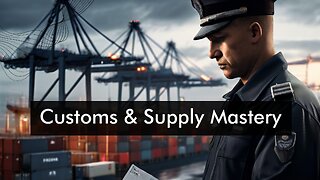Premium Only Content

The Essential Guide to Customs Bonds: Choosing the Right Option for Your Imports!
ISF Depot // 661-246-8217 // [email protected] // www.isfdepot.com
In today's video, we discussed the Importer Security Filing (ISF) and its significance in the import process. We emphasized the importance for importers to understand the ISF timeline and submission requirements in order to ensure a smooth and efficient import process. The ISF must be filed at least 24 hours before the goods are loaded onto a vessel bound for the US, allowing Customs and Border Protection (CBP) to assess potential risks and inspect cargo if necessary.
We then discussed the basic submission requirements for the ISF, highlighting the key pieces of information that need to be included. These include buyer and seller information, manufacturer or supplier information, container stuffing location, consolidator or stuffer information, HTSUS number, and container and seal number. By providing accurate and complete information, importers can facilitate the clearance of their goods through customs.
Moving on, we touched on the crucial aspect of the customs bond. A customs bond is a financial guarantee between the CBP and the importer or customs broker, ensuring the payment of duties, taxes, and other fees to the government. Importers have two options for securing a customs bond: a single entry bond for specific import transactions and a continuous bond that remains in effect for one year and covers all import transactions within that period. Continuous bonds are recommended for frequent importers as they streamline the process and minimize the need for multiple bond filings.
We then shifted our focus to the role of a customs broker in the import process. A customs broker is a licensed professional who assists importers in clearing their goods through customs. Their deep understanding of complex regulations allows them to ensure compliance and facilitate a smooth import process. One of their key responsibilities is to ensure the accuracy and completeness of the ISF. They work closely with importers, gathering necessary information and submitting the ISF on their behalf.
Lastly, we mentioned the consequences of non-compliance with the ISF requirements. Failure to file an accurate and timely ISF can result in penalties, cargo holds, or even refusal of shipment. It is crucial for importers to understand and adhere to the ISF guidelines to avoid these potential issues.
In summary, understanding the ISF timeline and submission requirements, as well as securing a customs bond, are key aspects of the import process. Working with a knowledgeable customs broker can greatly facilitate compliance and ensure a smooth import process. Thank you for watching, and don't forget to subscribe to our channel for more valuable information on customs brokerage and international trade.
#usimportbond #isfcustomsbroker #uscustomsclearing #isfentry
Video Disclaimer Here: This tutorial is independent and not affiliated with any US governmental entities.
-
 3:35
3:35
ISF Depot
5 days agoSecuring International Trade: Customs Brokerage in the Digital Age
5 -

TimcastIRL
3 hours agoTrump Calls Democrat RETARDED, Whistleblower EXPOSES Democrat FRAUD | Timcast IRL
158K44 -
 LIVE
LIVE
Akademiks
2 hours agoMeg Thee Stallion spent $2 mil on lawyers to win $59k vs Milagro! 50 Cent BURIES Diddy. SNAKES HIM!
1,058 watching -
 LIVE
LIVE
SpartakusLIVE
3 hours agoI'M BACK from Florida || The RETURN to the Spartan Stronghold
317 watching -

Joker Effect
1 hour agoWhy is everything so DIFFICULT?! Cuffem, Gypsy Crusader, WVAGABOND is getting SUED?! IDuncle is mad!
6.65K -

Flyover Conservatives
21 hours agoInside the Kill Zones: Kidnappings, Camps & the War on Nigerian Christians Exposed - Judd Saul | FOC Show
12.2K1 -
 1:02:35
1:02:35
MattMorseTV
3 hours ago $0.53 earned🔴We just got the CONFIRMATION.🔴
27.2K49 -
 1:24:52
1:24:52
Glenn Greenwald
5 hours agoTrump Admin Preparing for New Regime-Change War Against Venezuela; Who Should Win Anti-Semite of the Year? See the Top 10 Finalists | SYSTEM UPDATE #551
106K59 -
 23:12
23:12
Jasmin Laine
7 hours agoCBC TURNS on Carney—Poilievre Speech Goes VIRAL, ROASTS Canada’s Elites
21.9K17 -
 1:16:21
1:16:21
The Daily Signal
6 hours ago $0.21 earned🚨BREAKING: Tim Walz Self-Destructs Over BILLIONS in Fraud Under His Watch, War Crime Allegations
20.5K6